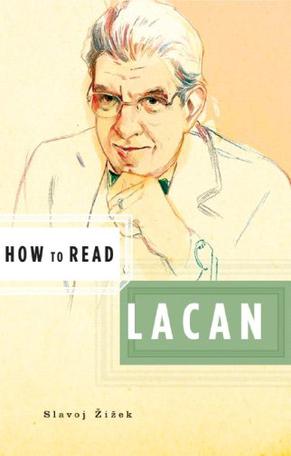-

The Sublime Object of Ideology
Slavoj Zizek, the maverick philosopher, author of over 30 books, acclaimed as the "Elvis of cultural theory," and today's most controversial public intellectual. His work traverses the fields of philosophy, psychoanalysis, theology, history and political theory, taking in film, popular culture, literature and jokes all to provide acute analyses of the complexities of contemporary ideology as well as a serious and sophisticated philosophy. His recent films The Pervert's Guide to the Cinema and Zizek! reveal a theorist at the peak of his powers and a skilled communicator. Now Verso is making his classic titles, each of which stand as a core of his ever-expanding life's work, available as new editions. Each is beautifully re-packaged, including new introductions from Zizek himself. Simply put, they are the essential texts for understanding Zizek's thought and thus cornerstones of contemporary philosophy. -

How to Read Lacan
The How to Read series provides a context and an explanation that will facilitate and enrich your understanding of texts vital to the canon. These books use excerpts from the major texts to explain essential topics, such as Jacques Lacan's core ideas about enjoyment, which re-created our concept of psychoanalysis. Lacan s motto of the ethics of psychoanalysis involves a profound paradox. Traditionally, psychoanalysis was expected to allow the patient to overcome the obstacles which prevented access to "normal" sexual enjoyment; today, however, we are bombarded by different versions of the injunction "Enjoy!" Psychoanalysis is the only discourse in which you are allowed not to enjoy. Slavoj i ek s passionate defense of Lacan reasserts Lacan s ethical urgency. For Lacan, psychoanalysis is a procedure of reading and each chapter reads a passage from Lacan as a tool to interpret another text from philosophy, art or popular ideology. -

Zizek's Jokes
“A serious and good philosophical work could be written consisting entirely of jokes.”—Ludwig Wittgenstein The good news is that this book offers an entertaining but enlightening compilation of Žižekisms. Unlike any other book by Slavoj Žižek, this compact arrangement of jokes culled from his writings provides an index to certain philosophical, political, and sexual themes that preoccupy him. Žižek’s Jokes contains the set-ups and punch lines—as well as the offenses and insults—that Žižek is famous for, all in less than 200 pages. So what’s the bad news? There is no bad news. There’s just the inimitable Slavoj Žižek, disguised as an impossibly erudite, politically incorrect uncle, beginning a sentence, “There is an old Jewish joke, loved by Derrida . . .“ For Žižek, jokes are amusing stories that offer a shortcut to philosophical insight. He illustrates the logic of the Hegelian triad, for example, with three variations of the “Not tonight, dear, I have a headache” classic: first the wife claims a migraine; then the husband does; then the wife exclaims, “Darling, I have a terrible migraine, so let’s have some sex to refresh me!” A punch line about a beer bottle provides a Lacanian lesson about one signifier. And a “truly obscene” version of the famous “aristocrats” joke has the family offering a short course in Hegelian thought rather than a display of unspeakables. Žižek’s Jokes contains every joke cited, paraphrased, or narrated in Žižek’s work in English (including some in unpublished manuscripts), including different versions of the same joke that make different points in different contexts. The larger point being that comedy is central to Žižek’s seriousness.